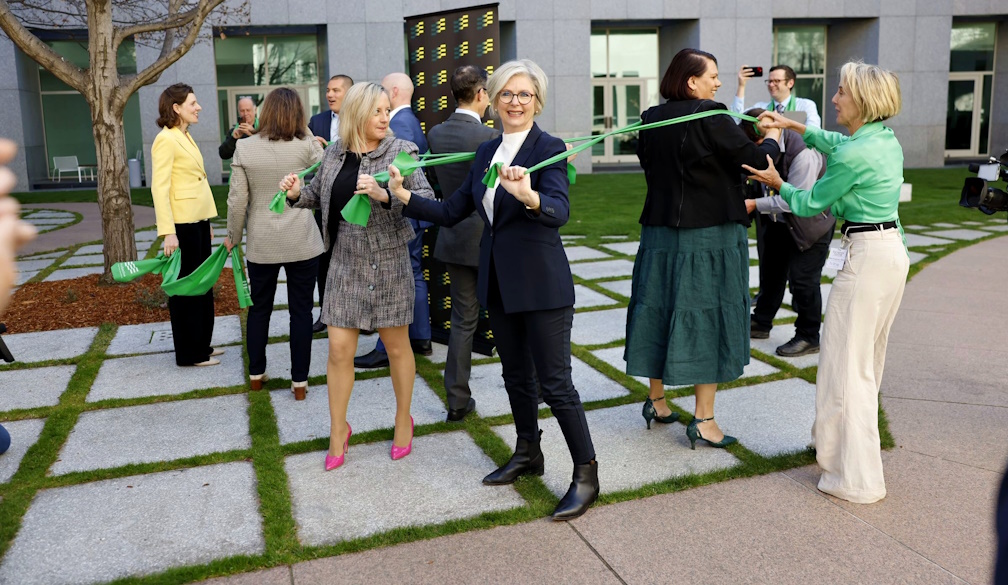MPs demonstrate they are ‘Fit for Office’ with Exercise Challenge

More than 13 Federal Parliamentary members and 70 of their staff are being put through their paces to prove they are ‘Fit for Office’ during the four-week ‘Fit for Office Get All Parliamentarians Physically Active’ challenge to raise awareness of the importance of regular physical activity.
The initiative is from AUSactive – Australia's peak body for the exercise and active health sector – to tackle Australia’s inactivity and health crisis and relieve the economic burden on the healthcare system by raising awareness of the importance of regular physical activity.
AUSactive’s Barrie Elvish says, “We are a shocking example to our children and are already at the bottom of the barrel and terrible role models to the next generation.
“The idea to get Australians moving more is to start from the top, which is why the MPs and their staff are rising to the challenge to prove they are ‘fit for office’. This is a challenge for all abilities, which is why it is based on heart rate effort, not steps – and all movement counts!”
Data shows:
Australia is ranked 140th out of 146 countries for the highest physical inactivity levels for adolescents
89% per cent of Australian 11-to -7-year-olds fail to perform at least an hour of physical activity per day
More than half of Australian adults (56%) do not meet recommended physical activity guidelines
67% of Australian adults are obese or overweight
Signed up to the challenge so far are:
David Pocock – former Wallabies Captain and the first Independent Senator for the ACT
Hon Dr Andrew Leigh – Assistant Minister for Competition, Charities and Treasury – Member for Fenner
Ms Kristy McBain – Minister for Regional Development, Local Government and Territories
Malarndirri McCarthy – Assistant Minister for Indigenous Australians and Assistant Minister for Indigenous Health
Dorinda Cox, Senator for Western Australia
Senator the Hon Anne Ruston – Shadow Minister for Health, Aged Care and Sport
Melissa McIntosh – Shadow Assistant Minister for Mental Health and Suicide Prevention
Dr Sophie Scamps – Member for Mackellar
Ms Allegra Spender – Member for Wentworth
Angie Bell – Shadow Minister for Early Childhood Education Shadow Minister for Youth and Member for Moncrieff
Dr Helen Haines – Independent Member for Indi
Fiona Phillips – Member for Gilmore
Rebekha Sharkie – Federal Member for Mayo
Tammy Tyrrell – Senator for Tasmania
Dorinda Cox – Senator for WA and Australian Greens Spokesperson on First Nations, Mining and Resources, Sport, Trade, Tourism
The MPs and their teams’ efforts will be measured via wearable MyZone heart rate monitors to track their physical activity and results shown on a group leader board.
The challenge will be across four categories:
Top MP Point Earner
Top Office Point Earner
Top Office Point Average
The most MPs and Federal office staff participants to reach the World Health Organisation Guidelines for Physical Activity of 150 minutes of moderate-intensity aerobic physical activity (or at least 75 minutes of moderate and vigorous-intensity physical activity) per week
Not getting enough physical activity is associated with anxiety and depression and increases the risk of many diseases such as type 2 diabetes, bowel cancer, dementia, heart disease, strokes, uterine and breast cancer.
Mr Elvish, adds, “Physical inactivity must be addressed as it is a major public health issue in Australia. We are ranked 140th out of 146 countries for the highest physical inactivity levels for adolescents – a shocking statistic.
“There are huge savings to be made to the Australian health budget by increasing physical activity and AUSactive's position is that prevention is better than cure.
“With rates of obesity increasing year-on-year coupled with a health system that is already bursting at the seam, the Federal Government needs to invest in, and allocate funding, to a greater scope of preventative health initiatives, programs and activities.
"To reduce Australia’s growing rates of chronic disease, and consequent demands on the health system, we are asking the Federal Government to accelerate its current preventative health strategy and be more proactive.
“Health reform is important because historically, Australian governments have spent more time and money addressing health issues after they have become a problem, rather than acting to prevent the problems arising in the first place.”
Myzone has developed a unique measurement called ‘MYZONE Effort Points’ (MEPs) that uses heart rate data to quantify physical activity based on each person’s effort. The harder they work, the more MEPs/minutes they earn, which levels the playing field in ways that steps, distance, or minutes cannot.
AUSactive supports the Australian Government’s commitment to the WHO’s Global Action Plan for Physical Activity that the previous government signed up to in 2018 through this campaign. The Plan is designed to encourage 15% more Australians to be more active by 2030.



















